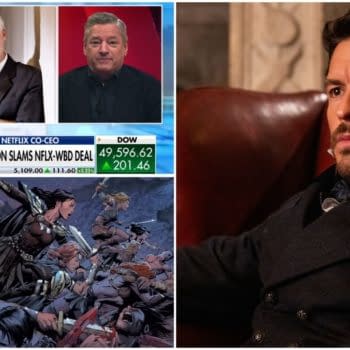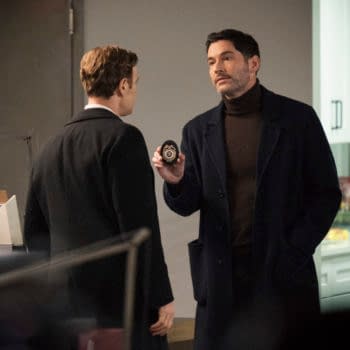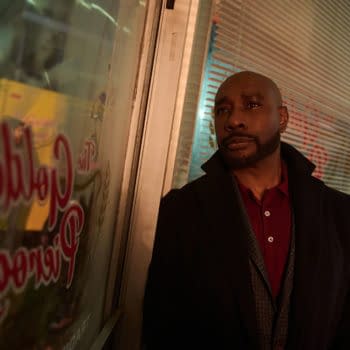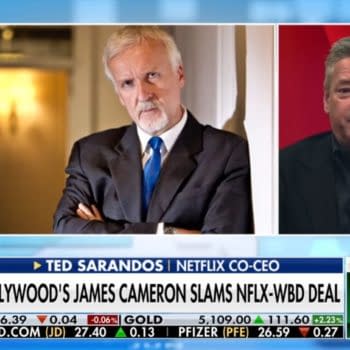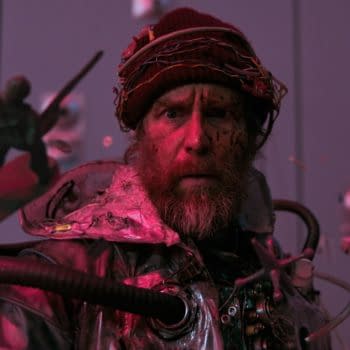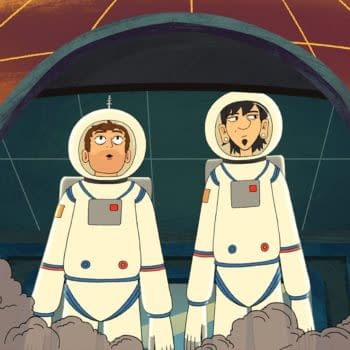Posted in: CBS, Current News, Editor's Picks TV News, Movies, Recent Updates, Review, TV | Tagged: ABC, Adam Storke, Annette O'Toole, cable, cbs, colm feore, Corin Nemec, David Soul, Dennis Christopher, Gary Sinise, Harry Anderson, HRL, IT, james mason, Jamey Sheridan, John Ritter, Laura San Giacomo, Matt Frewer, miguel ferrer, Molly Ringwald, Ossie Davis, Pennywise, Ray Walston, Rebecca De Mornay, Richard Masur, Richard Thomas, rob lowe, Ruby Dee, Salem's Lot, stephen king, Steven Weber, Storm of the Century, syfy, television, the shining, The Stand, tim curry, Tim Daly, Tim Reid, tobe hooper, tv
Stephen King Has Had A Pretty Good Run On TV, Actually
Stephen King has transcended to that special level of societal acceptance known as the "lovingly take you for granted because we assume you'll always be around" stage. It's not meant as an insult, more as a testament to how long you've sustained a solid level of quality to the extent that people just assume it from you 24/7. He's like Tom Hanks and Oprah Winfrey…The Simpsons and Supernatural…Skittles and Kozy Shack chocolate pudding.
What helps King's cause is that the man is righteously prolific, pumping-out books on a regular basis at the rate of three authors. Let me put it this way: in the time it took for you to read this, he just finished two novels, three essays, a haiku, and the dishes. With works like Mr. Mercedes, The Green Mile, The Colorado Kid and Joyland, he's shown that he knows how to weave tales outside the horror genre.
But with all the positives that come along with the "lovingly take you for granted because we assume you'll always be around" stage, King's also suffered from it. In the interest of pulling off the band-aid quickly, I'll just put it out there: by and large, TV and film adaptations of King's stuff almost always suck. To be clear and completely up-front? I won't deny that there's been a river of crap flowing for years that's called itself Stephen King Adaptations. It has lots of banks for you to go family-picnic on; and they have names like Graveyard Shift, The Mangler, and The Langoliers.
But I'm here to preach to ya that maybe we've gotten a little collectively caught up in the cliché that all King adaptations suck and need to be reminded of the quality television adapts that rolled out over the years. In fact, I'll keep all of my selections at pre-2000 years for both the challenge and to make my point.
So I'm going to go with five and base it off of the ones I remember seeing that still have some level of impact on me today. I could definitely go more than five, but "five" seems like your safe, standard clickbait-able number to go with:
Salem's Lot (1979)
Originally broadcast on CBS on November 17th and 24th, 1979 in two two-hour segments, Salem's Lot boasts a pedigree that includes the great horror director Tobe Hooper (The Texas Chainsaw Massacre, Poltergeist) as well as '70s poster child David Soul (Starsky & Hutch) and versatile actor James Mason (The Boys From Brazil, Heaven Can Wait).
Hooper did a very effective job of not only enhancing the "vampire" and "haunted house" aspects of King's story, but also combining them in a way that created a unique "big bad" for the story. The biggest highlight of the miniseries was actually a change to the novel made by producer Richard Kobritz: in the novel, Kurt Barlow is a cultured, human-looking villain. But in the film, Barlow (Reggie Nalder) is portrayed as a speechless, demonic-looking vampire as a homage to the German vampire film Nosferatu. It would be a long time before a 9-year-old me would go anywhere near any old abandoned houses after seeing this one.
It (1990)
Directed by Tommy Lee Wallace (Halloween III:Season of the Witch) as a four-part, eight-hour miniseries for ABC, It has two major things going for it: a cast that's like a "who's who" of '70s/'80s television stars (Richard Thomas, John Ritter, Annette O'Toole, Harry Anderson, Dennis Christopher, Tim Reid and Richard Masur) giving performances well above what I thought were their "acting pay grades" at the time. Tim Curry as Pennywise was one of the most memorable villains in the past 40 years.
Granted, the ending falls apart a bit due to ABC's lack of a decent special effects budget (that spider thing? Yeah…). But that lack of a budget also served to highlight even more just how much of Curry went into Pennywise: the man did more with basic clown face paint and costume than 99% of big-budget films could do with a $30 million effects budget.
The Stand (1994)
The '90s were like the honeymoon years between ABC and King, and it definitely showed with The Stand. Aired over four nights, King's tale of man-made devastation leading to a near-apocalyptic struggle between good and evil was given all of the epic approach that the network could muster — and it showed.
With a huge cast (including Gary Sinise, Miguel Ferrer, Rob Lowe, Ossie Davis, Ruby Dee, Jamey Sheridan, Laura San Giacomo, Molly Ringwald, Corin Nemec, Adam Storke, Ray Walston, and Matt Frewer) and a budget of over $28 million (huge for a network series at that time), The Stand still holds up to this day. Three performances in particular to check out: Sheridan's more-ego-than-smarts villain Randall Flagg; Frewer's disturbingly deteriorating "Trashcan Man" as he melts his way to Las Vegas; and Parker Lewis Can't Lose's Nemac as vindictively creepy Harold Lauder.
The Shining (1997)
Directed by Mick Garris almost three years after The Stand, this adaptation is 10 times better than Stanley Kubrick's The Shining. Why? Because this miniseries is actually Stephen King's The Shining and not something that's (at best) based loosely on the source material.
Steven Weber gives us a Jack Torrance who truly loves his family and feels like he can fix everything if he can just make this work, even as his own inner demons begin to manifest themselves in reality. This was Jack Torrance…not an excuse for Jack Nicholson to chew up screen time by portraying a jacked-up caricature of himself. It speaks volumes that while King had to stay quiet for so long about his thoughts on Kubrick's version, he had no hesitation adapting the novel himself when it came time for a new version. And don't forget Rebecca De Mornay's Wendy Torrance, who comes across less as a victim and more of a fighter this go-around.
I'd be curious to know how Kubrick's decision to kill off Dick Hallorann (Scatman Crothers) would go over in 2017? In the book, Hallorann is actually the hero who resists the temptations of The Overlook and helps get Wendy and Danny to safety. Kubrick's take? Have Nicholson kill off the only person of color in the book — who also happens to be the hero — with an axe to the chest the moment he arrives on scene. A bad call on a ton of levels — one of about a dozen issues I have with the highly overrated film.
Storm of the Century (1999)
Storm of the Century is a little different: instead of being an adaptation, this was actually based on an original screenplay written by King for the ABC miniseries. Examining what happens to the small town of Little Tall Island (also the setting for Dolores Claiborne) when it's forced to face its own dark secrets as they face down both a major storm and a demonic visitor with a simple request: "Give me what I want, and I'll go away." It's what he wants that might just tear the town apart.
Even with a bibliography as dark and sinister as King's, Storm of the Century is not the miniseries to watch if you want your faith in humanity restored or a cheerful happy ending. If you're looking for a story that's raw and plays upon our own internal horrors than just your typical "hack/slash" film, then treat yourself to this. Colm Feore's Andre Linoge may seem like the "ultimate big bad" of the story, but you have to respect that he never pretends to be anything that he's not. And as his presence begins to expose more and more of the town's secrets, we realize that Linoge might just be the lesser of dozens of evils.
While I won't spoil the ending for you, I challenge anyone with a decent heart and any semblance of a soul to not be torn up over the last scene with Constable Michael "Mike" Anderson (Tim Daly, proving yet again that Wings alums do well in King adapts) after he's moved to the west coast.












